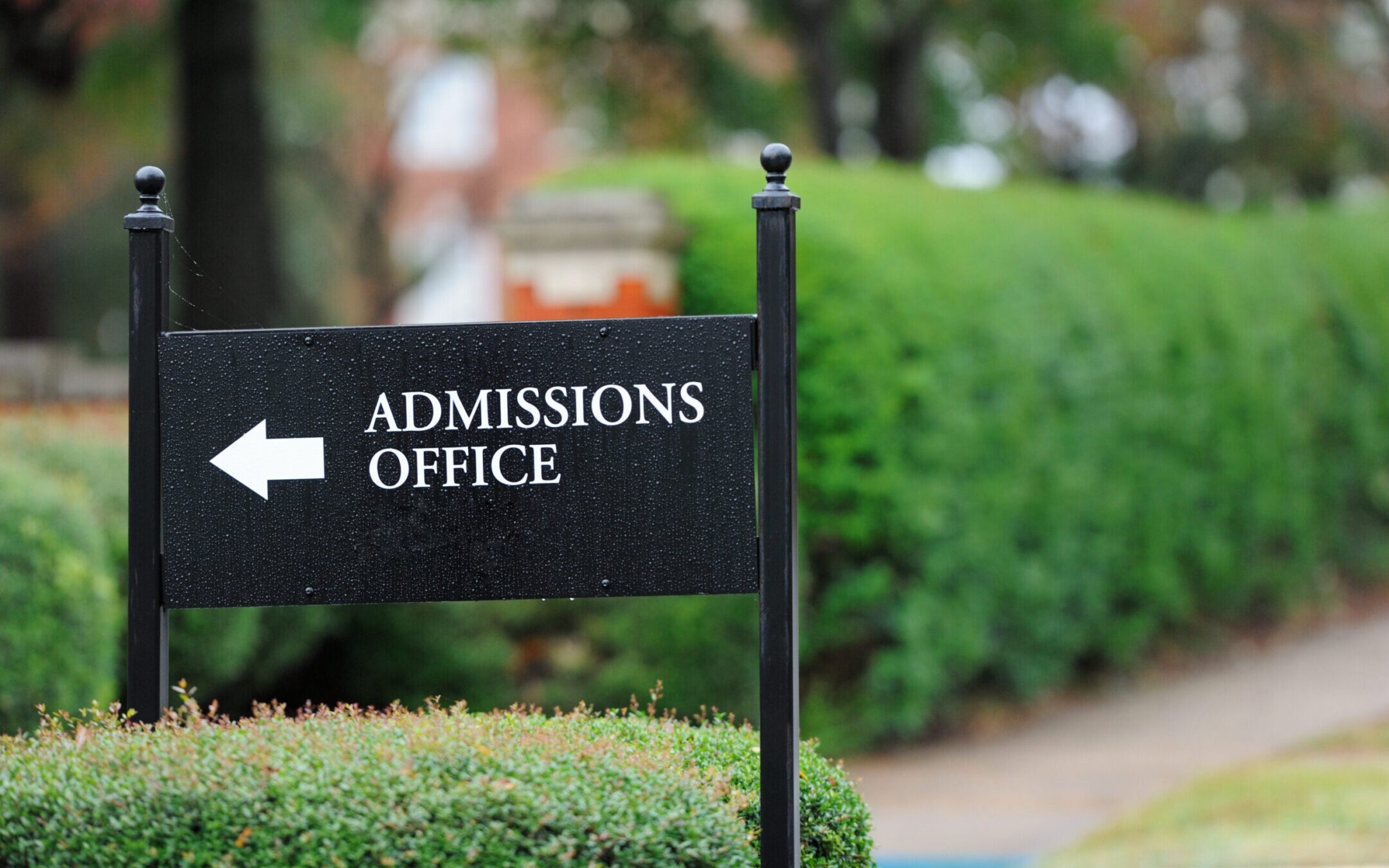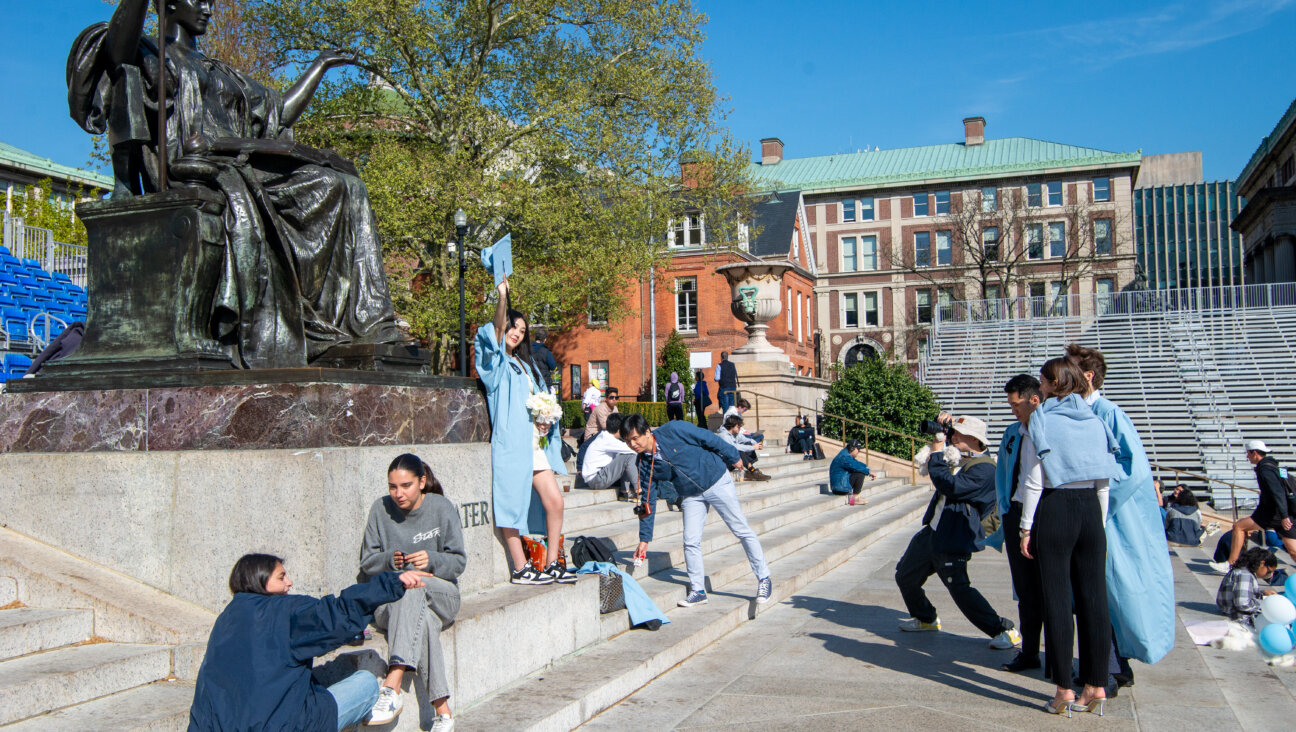Meeting a deadline, Education Department briefs Jewish groups on new efforts to combat campus antisemitism

Close up of admissions office sign near a university campus. (Getty Images)
WASHINGTON (JTA) — Top Education Department officials met their own deadline in responding to a spike of antisemitism on college campuses by holding a virtual hourlong briefing on Monday with Jewish organizational leaders.
Some of those leaders offered praise that the department was sticking to its promise to draft a plan for campus antisemitism within two weeks, while others said they were frustrated by the pace of progress.
The virtual hour-long briefing on Monday came two weeks after Miguel Cardona, the secretary of education, met in person with Jewish leaders alarmed by reports of antisemitic attacks and harassment on campuses following Hamas’ Oct. 7 attack on Israel and Israel’s military response.
“It was a continuation of their efforts to be transparent about what they’re doing to address antisemitism, both in K through 12 schools and in higher education institutions,” said Talya Steinberg, the associate director for government relations at the National Council of Jewish Women.
Participants said they appreciated the attention; Cardona himself briefly introduced the proceeding and two of his top officials, Cindy Marten, the deputy secretary, and Catherine Lhamon, the assistant secretary for the Office of Civil Rights, ran the session.
Officials described the outsized volume of complaints they had received since Oct. 7 and their continuing visits to campuses to meet with Jewish students. They reviewed reminders they sent to federally funded colleges last week that they have a legal obligation to address complaints of antisemitism, and they reported that they would meet this week in Washington with leaders of federally funded colleges and K-12 schools to discuss the issue.
At least two Jewish officials present said the presentation was welcome but they were concerned that the department was not being proactive enough.
“We appreciated that the secretary, the deputy secretary, and everybody else on the team is taking this seriously,” said Nathan Diament, the Washington director of the Orthodox Union. “They realize this is a crisis. But we’re still looking to them to match their actions to the moment in terms of being as aggressive as possible and as proactive as possible.”
Kenneth Marcus, the chairman of the Brandeis Center, a Jewish civil rights group with an emphasis on campuses, said there were further specific steps the Biden administration could take, including identifying cases of discrimination when they hit the news and not waiting for reports from Jewish groups.
“They shouldn’t have to wait for us,” said Marcus, who held Lhamon’s job in previous Republican administrations. “We’re all overstretched.” Among other measures, he recommended that the department’s Office of Civil Rights initiate investigations based on publicly available news and information “rather than simply waiting for complaints to roll in.”
A number of those who attended said they appreciated that the process would necessarily be deliberate, as each complaint is assessed and investigated and every accused institution and individual gets due process.
Amy Spitalnick, the CEO of the Jewish Council for Public Affairs, a national public policy group, said it was unreasonable to expect the department to accelerate complaints about antisemitism over other complaints.
“It’s important to actually follow the process because there should be one transparent standard for any Title VI complaint no matter the student’s background,” she said, referring to the section of the 1964 Civil Rights Act that bars discrimination. “And so that means going through that process, it means investigating, it means requiring if there is a violation found they can seek voluntary action before removing funds and then if necessary, removing the funds.”
Cardona said last week that removing federal funding from schools that fail to address antisemitism is an option, and Lhamon wrote a letter to federally funded colleges reminding them that they are obligated under the law to address complaints of antisemitism and other forms of religious bigotry.
Rabbi Jill Jacobs, who directs T’ruah, a rabbinic human rights group, said campuses should provide Jewish students with immediate relief but added that the federal government needed to be judicious in how it applied the penalties available to it.
“A student on campus might want something to happen immediately and the campuses do have responsibilities to make sure that students feel safe,” she said. “That’s largely the responsibility of adults on any given campus. But that doesn’t mean that the [Biden] administration needs to jump in and just pull money without even investigating and finding out what the facts are.”
Some 30 officials from an array of organizations, including the Jewish Federations of North America, the Conference of Presidents of Major American Jewish Organizations, Hillel, the Reform, Orthodox and Conservative movements, and Jewish civil rights groups, attended the meeting over Zoom.
Steinberg said that it was evident that the complaints, filed through the Office of Civil Rights website, had spiked. “They just really stressed they’re going to continue to do investigations of cases,” she said. “They kind of focused on the great amount of cases that are coming in. Especially after Oct. 7, it’s been an influx of submissions.”
The Education Department’s media office did not reply to a request for comment.
This article originally appeared on JTA.org.

I hope you appreciated this article. Before you go, I’d like to ask you to please support the Forward’s award-winning, nonprofit journalism during this critical time.
Now more than ever, American Jews need independent news they can trust, with reporting driven by truth, not ideology. We serve you, not any ideological agenda.
At a time when other newsrooms are closing or cutting back, the Forward has removed its paywall and invested additional resources to report on the ground from Israel and around the U.S. on the impact of the war, rising antisemitism and the protests on college campuses.
Readers like you make it all possible. Support our work by becoming a Forward Member and connect with our journalism and your community.
Make a gift of any size and become a Forward member today. You’ll support our mission to tell the American Jewish story fully and fairly.
— Rachel Fishman Feddersen, Publisher and CEO
Join our mission to tell the Jewish story fully and fairly.




















